- Last Updated: February 16th, 2026
Key Takeaways
Acetaminophen, an ingredient in Tylenol, might increase the risk of developmental disorders like autism and ADHD.
Lots of lawsuits claim that Johnson & Johnson didn't warn about possible risks to pregnant women who take this drug.
The FDA plays a big part in these legal cases by looking at the science linking acetaminophen to health problems. They could even change label warnings for the medicine.
The Role Of Acetaminophen In Tylenol Lawsuits
On this page, we’ll discuss Acetaminophen’s impact on Tylenol Lawsuits, the history of Acetaminophen in Tylenol, who qualifies to file a Tylenol Lawsuit, and much more.
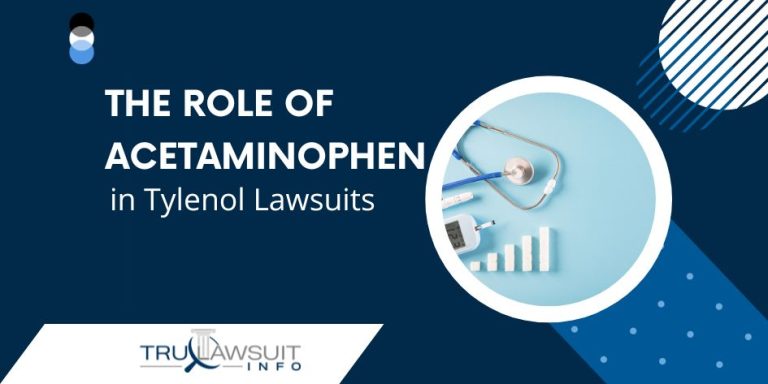
Intro to the Tylenol Lawsuits
Are you concerned about the connection between acetaminophen and developmental disorders like autism and ADHD?
Studies suggest that consumption of acetaminophen during pregnancy can potentially increase a child’s risk of developing such disorders.
This post will guide you through everything you need to know about Tylenol lawsuits linked to these concerns, providing updates on legal developments, FDA involvement, and advice for those affected.
Curious? Read on for more information.
To determine if your case qualifies for a Tylenol Lawsuit, feel free to use our chatbot on the website!
History of Acetaminophen in Tylenol
The journey of acetaminophen and Tylenol started in the late 19th century.
Acetaminophen, initially derived from coal tar, was clinically introduced as a pain reliever and fever reducer by Harmon Northrop Morse in 1878.
However, it did not gain significant recognition until over half a century later when Julius Axelrod discovered its unique properties that make it less harmful to use than aspirin or ibuprofen.
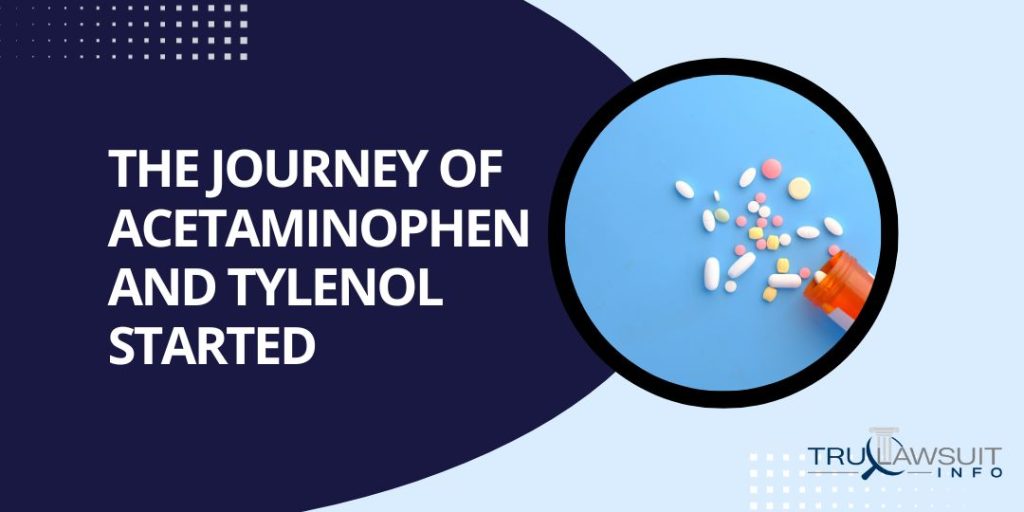
Tylenol arrived on the scene in the mid-20th century.
Specifically designed as an alternative to aspirin, Johnson & Johnson introduced Tylenol Elixir for kids in 1955.
The product quickly gained immense popularity with millions of Americans opting for this non-aspirin pain reliever.
By the late 20th-century, Tylenol had secured its place as one of America’s most trusted OTC drugs.
The litigation against J&J and generic acetaminophen producers sprouted following allegations surrounding prenatal exposure to acetaminophen found in products like Tylenol causing autism spectrum disorders (ASD) or attention deficit hyperactivity disorders (ADHD).
These serious concerns brought forth by parents have opened doors for numerous lawsuits under scrutiny today.
The Role of Acetaminophen in Tylenol Lawsuits
Acetaminophen, the active ingredient in Tylenol, has been linked to numerous health concerns including autism and ADHD, sparking a wave of lawsuits against the manufacturer.
Connection to Autism and Other Health Concerns
Research suggests a possible link between acetaminophen exposure and an increased risk of autism or ADHD in children.
Tylenol Lawsuits allege that Johnson & Johnson, along with generic acetaminophen makers, did not provide adequate warnings about this potential risk for pregnant women taking the drug.
There is further concern that using store-brand versions of acetaminophen during pregnancy may also lead to similar health issues in children.
This connection has led to numerous lawsuits seeking compensation through class action suits on behalf of those affected by such neurodevelopmental disorders.
With substantial medical records supporting these claims, the debate around Tylenol’s safety continues to intensify in the legal arena.
Tylenol Lawsuits and the FDA
The FDA’s active role in Tylenol lawsuits, examining their scrutinized involvement and demands for autism and ADHD warning labels on Tylenol products.
Learn more about how this regulatory body impacts the direction of these legal cases.
FDA’s Involvement in the Case For Tylenol Lawsuit
The FDA took an active role in the Tylenol Autism lawsuits, recognizing its responsibility to ensure the safety and proper labeling of over-the-counter medications like acetaminophen.
This federal agency became a crucial player in the case as it embarked on a thorough review of scientific evidence that allegedly linked acetaminophen to autism and other neurodevelopmental disorders.
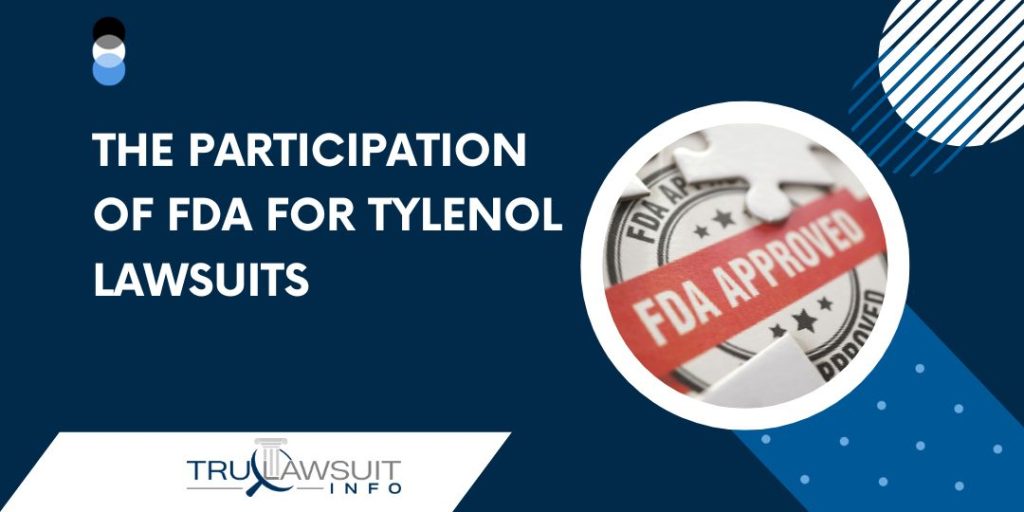
Aside from scrutinizing research data, the FDA also contemplated whether or not warning labels about potential risks should be added to drug packages containing acetaminophen.
With this action, future litigation around related health concerns could face significant changes, especially as they apply to pregnant women who use such medication during their pregnancy term.
Request for an ADHD Autism Warning Label
Mounting concerns over the possible link between acetaminophen and developmental disorders have led to a push for adding ADHD and autism warnings on product labels.
Parties involved in Tylenol-related lawsuits believe that this measure could be pivotal in protecting potential users.
They argue that consumers should be made aware of the alleged risks, especially among pregnant women whose unborn children may face exposure.
Upheld by scientific evidence suggesting acetaminophen’s influence on fetal brain development, their request is now awaiting an FDA decision which might bring about significant changes in public health policy and drug labeling standards.
Updates on Tylenol Lawsuits
Stay updated with the latest on Tylenol lawsuits, from case add-ons to hearing proposals and expert report objections.
Number of cases added to MDL
In the world of multidistrict litigation, or MDL, there has been a significant increase in Tylenol autism lawsuits.
As recently as October 2023, the total number of cases amounted to 188.
From these, 136 are currently pending and awaiting resolution within the framework of this complex legal system.
Worth noting is that since June 1st of that year alone, six new lawsuits have found their way into this growing collective action against generic acetaminophen products.
These figures reflect a continued escalation in legal actions holding corporations accountable for potential harm caused by over-the-counter pain relief options like Tylenol during pregnancy.
Proposals for Some hearings
Plaintiffs in the Tylenol lawsuit are seeking hearings as part of their legal strategies.
These hearings allow a judge to review and rule on the admissibility of expert testimonies before a case goes to trial.
This procedure can prevent juries from hearing unreliable or irrelevant evidence, which is crucial for maintaining the integrity of these complex lawsuits.
Parties involved in the Tylenol autism claims have proposed this approach as they believe it will streamline litigation proceedings.
They contend that Daubert Hearings can address issues surrounding expert reports, potentially eliminating lengthy debates at trial stages about their scientific validity and impact on fetal brain development.
The idea behind these proposals focuses mainly on creating more efficient paths towards resolution in these cases involving prenatal acetaminophen exposure.
Objections to Expert Reports
Legal teams representing the defendants in Tylenol autism lawsuits have recently raised objections to expert reports presented by the plaintiffs.
They argue that the scientific evidence used to draw a link between prenatal exposure to acetaminophen and neurodevelopmental disorders such as autism and ADHD is not strong enough.
The defense highlights concerns about the methodology used in these studies, questioning their reliability.
These criticisms are part of ongoing efforts by legal representatives for companies like CVS and Costco to dismiss claims related to generic acetaminophen products sold in their stores.
This development has further stoked debates over the admissibility of specific types of medical records within federal court proceedings, especially those concerning potential fetal brain development issues due to acetaminophen use during pregnancy.
Latest Developments in Tylenol Class Action Lawsuit
New research on the effects of acetaminophen has surfaced, there have been revisions to plaintiff fact sheets in the Tylenol lawsuit, and there’s an exclusion of defense experts occurring.
New Study on the Effects of Acetaminophen
The recently conducted study further establishes the link between prenatal acetaminophen use and developmental disorders in children.
This study suggests that pregnant women who consume over-the-counter drugs containing acetaminophen may increase the chances of their unborn children developing autism or attention deficit hyperactivity disorder (ADHD).
The research shows a 20% to 30% increased risk for these neurodevelopmental disorders following prenatal exposure to acetaminophen.
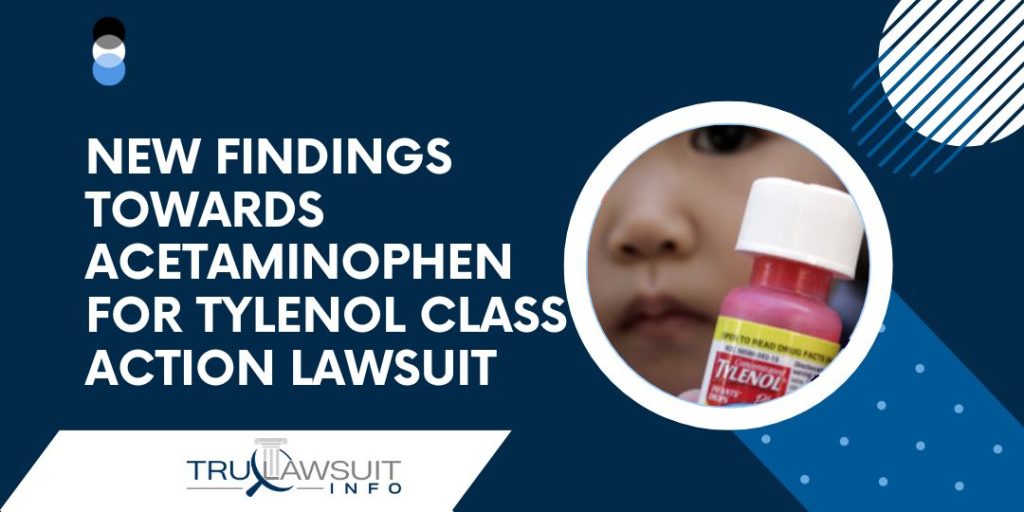
Findings like this provide valuable evidence in ongoing lawsuits against Tylenol, asserting the connection between autism, ADHD, and its major ingredient – Acetaminophen.
Additionally, this breakthrough study helps clarify why the judge presiding over Tylenol’s multidistrict litigation dismissed claims against CVS and other retailers regarding failure to appropriately warn consumers about potential risks under Texas law.
Revisions to Plaintiff Fact Sheets
The legal framework of the Tylenol class action lawsuit witnessed a significant development with modifications to plaintiff fact sheets.
These revisions encompass a detailed portrayal of plaintiffs’ claims and allegations against Johnson & Johnson, the defendants in this case.
Furthermore, they shed light on specific injuries or damages incurred by plaintiffs due to prenatal Tylenol use.
These revised fact sheets stand as crucial blueprints of the ongoing lawsuits, expanding knowledge on acetaminophen’s controversial role.
Moreover, they highlight various legal arguments and theories staked by plaintiffs to corroborate their stance in court.
Thus, these updates serve not only as informative resources but also reveal possible litigation strategies adopted by affected parties within this high-profile case.
Exclusion of Defense Experts
In a significant turn of events, the court ruled out defense experts from participating in the Tylenol class action lawsuit.
Plaintiffs argued against Dr. D’Alton’s credibility, as his specialization in Obstetrics and Gynecology put him at a disadvantage to make authoritative claims on the connection between autism and acetaminophen usage during pregnancy.
This exclusion puts a dent in the defense’s argument strategy for Johnson & Johnson, aiming to dismount scientific evidence tying prenatal exposure to their chief ingredient – acetaminophen – with neurodevelopmental disorders such as Autism Spectrum Disorder and Attention Deficit Hyperactivity Disorder (ADHD).
The decision underscores how essential expert testimony is for both sides when attempting to sway judicial opinion.
Progress of MDL
There has been a significant increase in the number of cases over the summer, with several hearing requests denied and FDA’s unresolved decision on warning labels.
Increase in the Number of Cases Over the Summer
The summer of 2023 saw a sharp upswing in the number of filed Tylenol Autism lawsuits.
In fact, October alone witnessed 64 cases linked to prenatal exposure to Acetaminophen moved into the ongoing MDL for Tylenol.
This spell marked the highest increase within a single month, propelling the total count of cases under the Tylenol autism MDL to an alarming figure of 383.
Denied Hearing Requests
Several significant rulings came from the court regarding Tylenol lawsuits in late 2023.
Among these, the MDL judge denied multiple requests for hearings that could have potentially advanced some of plaintiffs’ cases.
This decision proved to be a setback for claimants hoping to argue their case before the court at an earlier date.
Such rejections can prolong proceedings, adding strain and uncertainty for those involved in legal battles.
For parties affected by this ruling, it underscored the necessity of robust preparation and strategic approaches in pursuing justice against large corporations such as Johnson & Johnson.
FDA Decision on Warning Labels
The FDA’s decision about the warning labels is a pivotal move in this multifaceted legal battle.
After thorough investigation and deliberation, the FDA reached a conclusion about whether to mandate more explicit warnings on acetaminophen products.
The agency considered compelling new research suggesting a connection between prenatal acetaminophen exposure and autism spectrum disorder diagnosis, according to recent updates on Tylenol lawsuits.
This shift reflects an ongoing evolution in regulations as scientific understanding advances, highlighting just how impactful these case decisions can become over time.
Despite objections from companies like Johnson & Johnson claiming that warning labels should fall under federal law jurisdiction, the court maintained its stance based on public health interests.
State Court Acetaminophen Lawsuits
Dive into the intricacies of state-level acetaminophen lawsuits, shedding light on how these legal battles unfold outside of the multidistrict litigation context.
Continue reading for an in-depth understanding and latest updates.
Explanation of Lawsuits Outside of the MDL
Certain lawsuits associated with Tylenol and acetaminophen file independently from the Multidistrict Litigation (MDL).
Plaintiffs opt for state courts when they believe local laws are more favorable to their case.
These independent suits may vary in terms of legal strategy, specific allegations, damages sought, and evidence required.
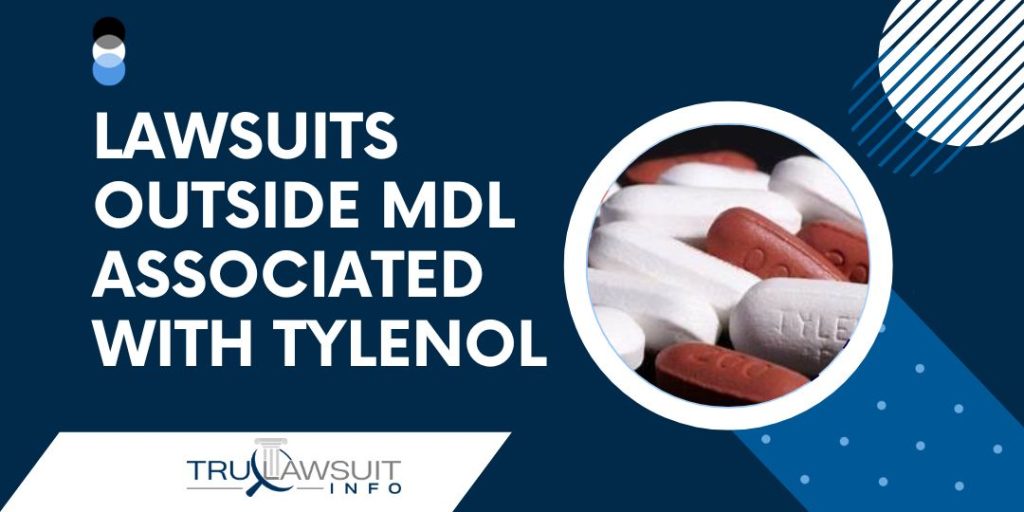
This contrasts the MDL process that consolidates similar cases under one federal court to streamline pretrial proceedings.
Despite being outside of the MDL, these exceptions are still crucial components in the overall landscape of acetaminophen lawsuits.
Challenges to Tylenol Lawsuits
This section presents the various challenges faced by Tylenol lawsuits, including Johnson & Johnson’s request for an immediate appeal, the exclusion of negligent misrepresentation claims and issues specific to lawsuits.
J&J’s Request for Immediate Appeal
Johnson & Johnson, in an attempt to expedite their case, sought an immediate appeal.
Postulating that the court’s previous decision was flawed, they insisted on a faster resolution.
However, this request was not met favorably by the court.
It flatly rejected J&J’s plea for haste and upheld its previous ruling confirming the continuation of litigations against alleged prenatal exposure to Tylenol.
The refusal thus cemented the stand of victims seeking justice through their lawsuits against possible health repercussions tied to Tylenol.
Barred Negligent Misrepresentation Claims
During the legal battles over Tylenol lawsuits, barred negligent misrepresentation claims have emerged as significant challenges.
In these particular instances, claimants allege that CVS and other retailers failed to adequately warn consumers about the potential link between acetaminophen use during pregnancy and increased risk of autism or ADHD in children.
However, these failure-to-warn claims were dismissed under Texas law.
Despite this denial, plaintiffs continue their pursuit for justice and compensation across multiple states.
This ongoing battle underscores the importance of transparency in pharmaceutical advertising and packaging information.
Problem with Texas lawsuits
Legal challenges have posed significant hurdles for the Tylenol lawsuits in Texas.
The crux of these lawsuits is the assertion that autism and ADHD resulted from prenatal exposure to acetaminophen, a key ingredient in Tylenol.
Plaintiffs argue that manufacturers failed to offer sufficient warnings about potential risks associated with using the drug during pregnancy.
However, the legal landscape shifted dramatically in May 2023 when an MDL (Multi-District Litigation) Judge dismissed failure-to-warn claims against CVS and other retailers under Texas law.
This move has fueled speculation and uncertainty among plaintiffs who’ve received this dismissal as a major setback in their pursuit for justice.
Despite this, 64 new cases have flooded courts all echoing similar arguments regarding prenatal acetaminophen exposure; marking a record-breaking influx of such lawsuits.
With so many similar cases pending, it’s evident that dealing with lawsuits will continue being fraught with complications moving forward.
Judge's Decisions
Discover the judge’s key rulings in Tylenol lawsuits, including a high-stakes rejection of preemption motions and government stance on warning labels. Intrigued?
Rejection of Preemption Motion
The Judge’s decision to deny the preemption motion was a significant turning point in these cases.
This pivotal ruling came when Walmart attempted to invoke federal preemption as a defense, arguing that state-law claims were barred due to inconsistencies with FDA regulations.
Their hopes for dismissal, however, were quashed by Judge Cote in October 2023.
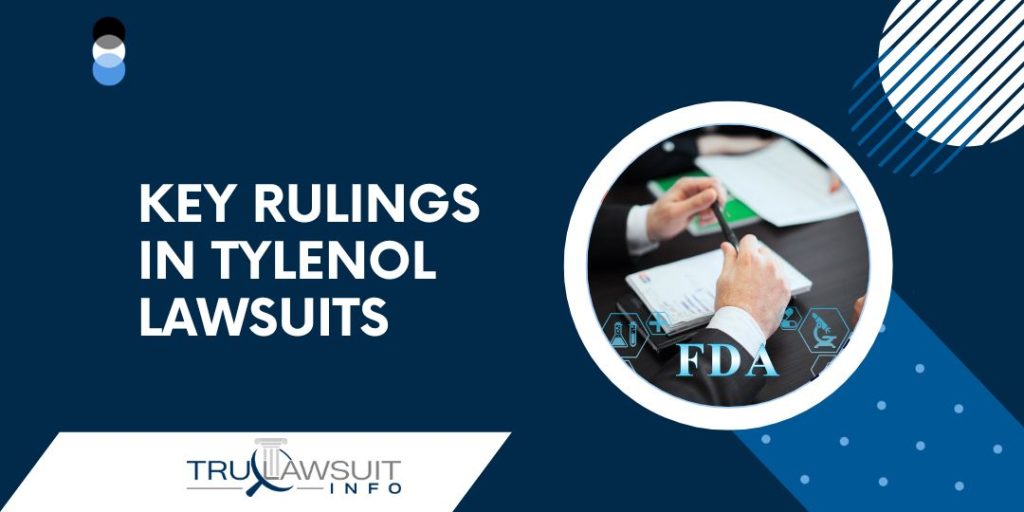
Similarly, pharmaceutical giant Johnson & Johnson experienced their share of courtroom setbacks when their request for immediate appeal and motion to dismiss Tylenol lawsuits linking acetaminophen to Autism Spectrum Disorder and Attention Deficit Hyperactivity Disorder (ASD-ADHD) were denied earlier in April of the same year.
These judicial pronouncements rejecting preemption have set the stage for more court battles and allowed the Tylenol lawsuits to move forward towards trial proceedings.
Government’s Opinion on Warning Labels
The judge overseeing the Tylenol Autism lawsuit has engaged in an unconventional step by requesting the government’s perspective on adding a proposed warning to acetaminophen drug labels.
This request directly involves the FDA, which is now expected to provide its insights on this crucial matter concerning Tylenol warning labels.
The government’s viewpoint holds significant weight and will potentially shape not only the outcome of the Tylenol Autism lawsuit but also decide if acetaminophen labels should include warnings about potential developmental disorder risks.
Thus, all eyes are now keenly set on what stance the government will take regarding these warning labels.
Encouraging Readers to Seek Legal Advice from TruLawsuit Info
TruLawsuit Info provides vital services for those affected by acetaminophen-related health issues.
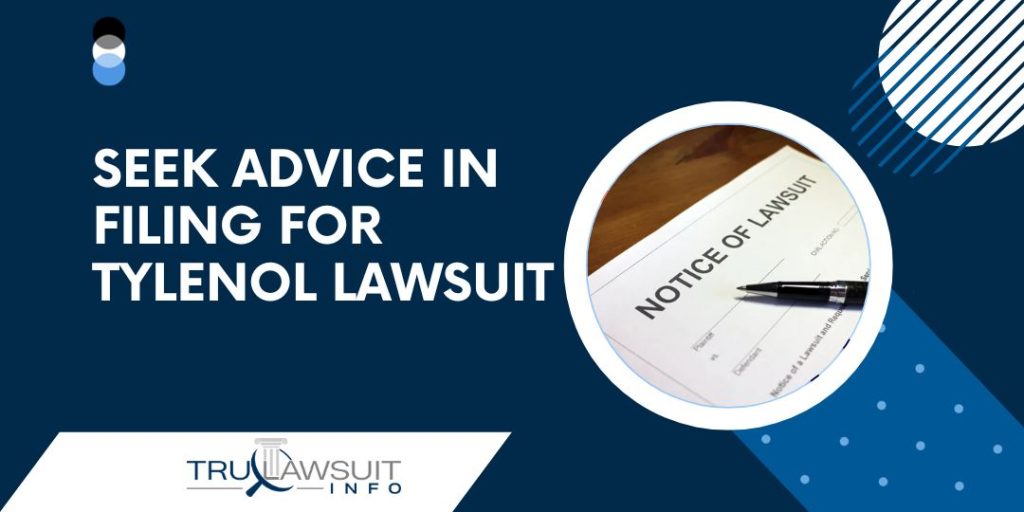
Here are the reasons why and how you should get in touch:
- Navigate through complex legal scenarios with the help of TruLawsuit Info.
- Get access to clear, comprehensible, and concise action plans for your Tylenol lawsuit claim.
- File your autism-related lawsuit effectively under TruLawsuit Info’s guidance.
- Find out about potential claims and compensation related to acetaminophen-induced autism cases.
- Have a free consultation service at your disposal anytime with this law firm.
- Be one step ahead by staying updated on ongoing Tylenol lawsuits from reliable sources like TruLawsuit Info.
- Seek assistance from seasoned professionals associated with well-known attorney groups like TruLawsuit Info.
Conclusion
As we get into the role of acetaminophen in Tylenol lawsuits, we find an escalating legal battle.
While science continues exploring the alleged connection between prenatal acetaminophen exposure and neurodevelopmental disorders, courts are flooded with plaintiffs seeking justice.
Understanding these intricate relationships is crucial to navigating this complex issue.
There’s no denying that their impact will shape future debates over pharmaceutical safety regulations and liability claims.
Frequently Asked Questions
-
Acetaminophen, the active ingredient in Tylenol, is being reviewed in lawsuits for its possible link to Autism Spectrum Disorder (ASD) and Attention Deficit Hyperactivity Disorder (ADHD).
-
If you believe fetal exposure to Acetaminophen resulted in ASD or ADHD diagnosis, consult with experienced Tylenol autism lawyers who can guide through the legal process.
-
Details about potential settlement amounts are typically confidential; however, you can reach out to your lawyer or follow updates on the Southern district of New York courts for potential information regarding settlements.
-
Yes! Several individuals have filed complaints that lead up to an autism class action lawsuit against the makers of Tylenol in various districts including New York.
-
Research showing higher levels of Acetaminophen in umbilical cord blood samples along with indications from studies linking usage during pregnancy are often cited as evidence supporting such claims making it part of many drug-centered complaints like ADHD lawsuits.

Attorney Jessie Paluch, founder of TruLawsuit Info, has over 25 years of experience as a personal injury and mass tort attorney, and previously worked as an international tax attorney at Deloitte. Jessie collaborates with attorneys nationwide — enabling her to share reliable, up-to-date legal information with our readers.
Legally Reviewed
This article has been written and reviewed for legal accuracy and clarity by the team of writers and legal experts at TruLawsuit Info and is as accurate as possible. This content should not be taken as legal advice from an attorney. If you would like to learn more about our owner and experienced injury lawyer, Jessie Paluch, you can do so here.
Fact-Checked
TruLawsuit Info does everything possible to make sure the information in this article is up to date and accurate. If you need specific legal advice about your case, contact our team by using the chat on the bottom of this page. This article should not be taken as advice from an attorney.
You can learn more about the Tylenol Lawsuits by visiting any of our pages listed below:
Here, at Tru Lawsuit Info, we’re committed to helping victims get the justice they deserve.
To do this, we actively work to connect them with attorneys who are experts in litigating cases similar to theirs.
Table of Contents
Tru Lawsuit Info is a reliable source of information about issues that may affect your health and safety, such as faulty products, data breaches, and environmental hazards.
Our team of experienced writers collaborates with medical professionals, lawyers, and advocates to produce informative articles, guides, and other resources that raise awareness of these topics.
Our thorough research provides consumers with access to reliable information and updates on lawsuits happening around the country. We also can connect consumers with attorneys if they need assistance.
Here, at Tru Lawsuit Info, we’re committed to helping victims get the justice they deserve.
To do this, we actively work to connect them with attorneys who are experts in litigating cases similar to theirs.
